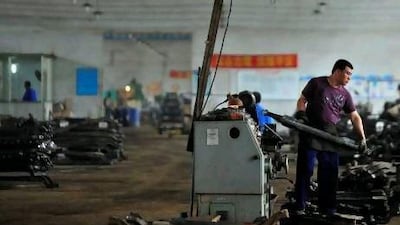China's stalling economy poses a bigger risk to the prosperity of the GCC than the escalating debt crisis in Europe, economists and the IMF warn.
The alarm came as data released yesterday signalled China's manufacturing sector shrank this month for the 11th month running. Similar data indicated factory production in the euro zone fell deeper into recession territory during the month.
But it is the shaky performance of the world's second-largest economy, rather than the euro-zone turmoil, that could cause more harm to this region.
"The biggest risk the GCC faces is not necessarily from the euro-zone crisis but from a hard landing in China," said Jean-Michel Saliba, the eastern Europe, Middle East and Africa economist at Bank of America Merrill Lynch.
"This is a huge black swan for the GCC if it materialises."
China's booming economy of recent years had been fuelled by a steadily surging flow of oil, petrochemicals and other materials from the GCC. But its energy-guzzling engine has started to splutter this year, raising the threat of softening demand for oil and other GCC goods.
Growth in China is expected to drop below 8 per cent this year for the first time since 1999.
Prices of Brent crude, the international benchmark, eased below US$108 per barrel in trading yesterday and are down about 14 per cent from their year high of $126.
Yesterday's dip came after the latest HSBC Flash China manufacturing purchasing managers' index showed activity remained negative this month, although slightly improved from the month before. The oil market had already been reeling after a pledge by Saudi Arabia to release more supplies.
Any sustained erosion in prices poses a threat to the trillions of dollars of infrastructure projects and social spending launched across many parts of the GCC in the past two years. The region's budgets have been drawn up on an estimation of an average oil price of $80 per barrel, Deutsche Bank analysts believe.
The IMF highlighted the external risks to Saudi Arabia, the GCC's largest economy, in a report released this week. Results from tests of economic models revealed the kingdom should be worried about China's slowdown.
"The results show that a negative output shock in the euro area or the United States has relatively little impact on the Saudi economy, whereas the sensitivity to shocks in China is more substantial," IMF analysts wrote in the report, released on Wednesday.
Four quarters of shrinking growth in China would result in a 0.5 per cent drop in Saudi's own economic expansion. In contrast, the same performance in the euro zone or the US economies over the same period would only put a 0.1 per cent dent in the kingdom's growth.
"These results partly reflect the effect that economic developments in each of these countries have on oil prices, with the China shock producing the biggest decline in oil prices and adversely affecting the Saudi economy," the report said.
The kingdom's trade with China has rocketed from next to nothing in 1990 to 13 per cent of Saudi's exports in 2010 and 11 per cent of its imports. Chinese trade links with the GCC have also swelled outside of oil. It is now the second-largest export destination for Dubai non-oil goods.
Still, the GCC's increased focus on China, India and other parts of Asia should be rewarded in the long term as growth in emerging markets outflanks the developed world.
"The urbanisation of China and Asia is one of the key strategic trends we are seeing," said Rajiv Biswas, the Asia-Pacific chief economist at IHS Global Insight.
"This will bring demand for chemicals and oil, which the GCC can benefit from."

